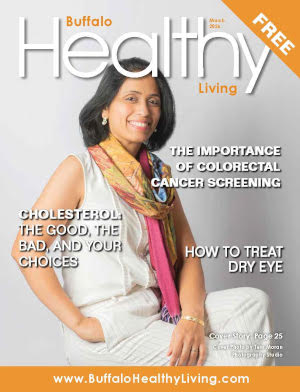April is Minority Cancer Awareness Month: Schedule Screenings Now!

Courtesy of Roswell Park Comprehensive Cancer Center
April is Minority Cancer Awareness Month, a time to help people of color know about their higher risk for cancer. “Our mortality rates are higher than any other ethnic or racial group,” notes Roswell Park Comprehensive Cancer Director of Community Outreach and Engagement Nikia Clark Robinson. “There’s distrust, insufficient talk between people and their doctors, and screening guidelines aren’t being followed. People in the Black and Hispanic/Latinx communities need to have as much support as possible.”
Black Americans have the highest mortality rate of any racial and ethnic group in the country across all types of cancer and for all cancers combined. Black men are twice as likely to die from prostate cancer and have a lower five-year survival rate for most cancers than other men. Black women have the same risk level for developing breast cancer but are 40% more likely to die from the disease.
“We know that Black women stop their treatment four to six weeks earlier than white women. Our most vulnerable women are having the worst outcomes and the highest mortality rates and aren’t even finishing treatment. Delaying by one to one and a half months might not seem like a big deal, but with cancer treatment, it’s significant,” says Clark Robinson, an expert on community engagement around health and cancer prevention. “We also know that Black or Hispanic/Latinx men are more likely to get lung cancer. If you’re Black, you’re prone to have worse outcomes from lung cancer if it’s not caught in the early stages. There’s also a stigma around lung cancer that we need to overcome.”
Roswell Park community outreach volunteers conduct community meetings, trainings, and talks about cancer risks. Volunteers understand the need for regular doctor appointments and health screenings, especially colonoscopies, because of the higher rates of colon cancer among people of color. And Roswell Park patient navigators work with patients and community members to make sure they keep and follow-up on appointments. These professionals are from underserved minority communities, and many are bilingual. “That’s extremely important,” Clark Robinson says, “because people often relate and respond more to people who look like them and likely share a common background and perspective.
People of average risk should start having regular cancer screenings. Those at higher risk for certain cancers, including breast and colorectal cancer, may need to begin these screenings earlier:
- Breast: Mammography for women ages 40 to 70 (frequency depends on risk factors)
- Cervical: Pelvic exam, Pap test and routine HPV testing for women ages 21 to 65
- Colorectal: Colonoscopy for men and women ages 45 and older
- Lung: Low-dose CT scan for men and women ages 50 and older with more than 20 pack-years of smoking history and have smoked in last 15 years
- Prostate: Digital rectal exam, counseling about PSA early detection and PSA testing (if desired) for men ages 45 and older
- Skin: Full-body skin check for patients with any suspicious lesion
Take a personal assessment to determine which screening tests you need at roswellpark.org/screening.









